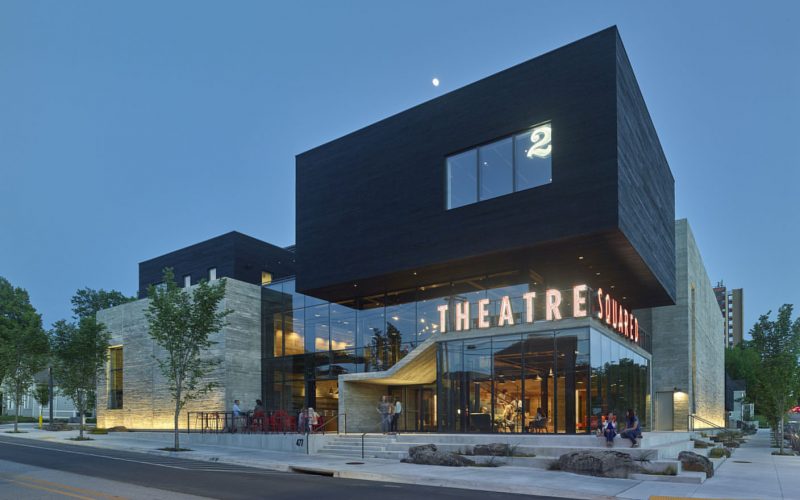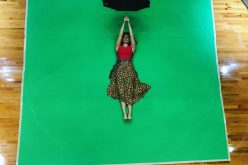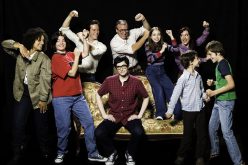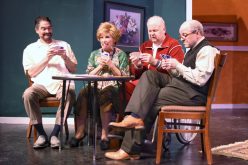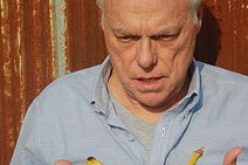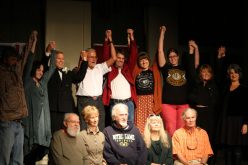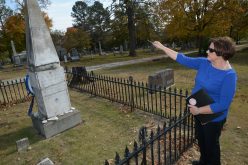“It’s a little bit like a fairy tale.”
Those are the last words you might expect to hear from TheatreSquared co-founder and artistic director Robert Ford — or anyone running an arts organization — at the end of a year like 2020. Broadway is officially shut down until May 2021, and theater companies around the globe have struggled all year to adapt to a world in which gathering in large numbers is dangerous.
Yet the 15-year-old regional TheatreSquared closed out the year by making a splash in national news. In October, T2 won a 2020 American Architecture Award for its new state-of-the-art 50,000-square-foot theater complex, which opened in 2018. That honor was quickly followed by accolades for the art that resides inside: The roller coaster ride started in late October, when NPR’s “All Things Considered” covered playwright Sarah Gancher’s “Russian Troll Farm,” T2’s collaboration with TheatreWorks Hartford and the Brooklyn-based Civilians. Things ramped up when The New York Times then named the show a Critic’s Pick and called it “smart and chewy.” Later that month, Elisabeth Vincentelli reviewed the production for The New Yorker. The company thought it had hit peak excitement when The Times called “Russian Troll Farm” a “wicked smart ride” and put it on their “Best Theater of 2020 List.”
But no, there was more to come: The Wall Street Journal’s Terry Teachout watched T2’s streaming production of Lauren Gunderson’s “The Half Life of Marie Curie,” and, in a glowing review, noted that he had been “hearing good things about Arkansas’ TheatreSquared for some time now.” Teachout goes on to give rave notes to the two stars of the show, Rebecca Harris and Leontyne Mbele-Mbong, and closes the review by saying, “I plan to keep an eye on TheatreSquared, which is clearly worth its fine reputation” and called T2 an “outstanding drama” company.
“It feels so affirming,” says T2 Executive Director Martin Miller of the national notice. Martin and Ford joined T2 Director of Marketing and Communications Joanna Sheehan Bell, Associate General Manager Shannon Jones, Director of New Play Development Dexter J. Singleton, and Artistic Associate and Program Director for the LatinX Theatre Project Rebecca Rivas on a Zoom call to reflect on the wild ride the theater company has experienced this year. “For Teachout to describe this as an outstanding drama company, first class theater — it’s like when you do really well on a test, but you don’t really know you did really well until you see the letter grade on the paper.
“It feels as though we’ve been doing really well on the test for 15 years, and we would hear from all the people that mattered most to us, our audience members, our artists, that this was a magical experience. ‘It’s a singular experience.’ ‘This is not like the other things.’ And we believed that,” Miller continues. “And yet it was really wonderful to see that grade, if you will — given by someone coming in from the outside who is respected by others across the country. And the same thing with The New York Times article. I think back to all of the artists who have been on our stages, all the people who have been on our staff and no longer are, our board members who are no longer with us and have even passed away — I think it’s affirming to all of those people, too.”
That T2 would have this spectacular end to the year was surely unpredictable back in March. Starting with their production of “Ann,” which was in an extended run, T2’s scheduled shows fell like dominoes — including the large-scale production of the musical “Matilda” whose ensemble of dozens of actors had already been cast.

“We’ve also discovered that there’s a slew of people who don’t go to the theater, haven’t even thought about going to the theater, but will happily watch something online,” says Robert Ford (right), seen here with Martin Miller at the beginning of March. “So this is is an added tool to expand our mission.”
(The Free Weekly/J.T. Wampler)
“I think uncertainty was the rule of every morning waking up, early on in the pandemic era,” says Miller. “Not that that has changed, but we’ve gotten used to it a little bit — this is the craziness we live in. But one of the things that was very uncertain was just how long this would last, and that remains uncertain. So we needed to come up with a strategy that would fit, regardless of when it ended or how long it went.”
That strategy, says Miller, was, essentially, “the show must go on” — and that meant some good old fashioned ingenuity. A flurry of activity followed the initial shutdown in the T2 offices: New tech was ordered, and the staff utilized personal contacts — one T2 team member had a friend whose position as the head of the live broadcast division of a Texas news channel made him a valuable advisor — as they also discovered previously hidden skills of those that they had worked beside every day.
“I’ve got to sing Joanna’s praises as a camera director in that room, calling which camera to use,” says Ford.
“She is turning out to be a great camera director behind the scenes,” agrees Miller.
It’s a good example of how every team member had to shift to learning new skills or reviving ones that might have faded.
“It has definitely tested my abilities,” says Jones. Jones has served as stage manager with T2 since 2014, and, in August was promoted to the position of Associate General Manager, similar to her stage management position in that she needs to turn her laser-sharp focus to many aspects of the organization’s functions. “The pandemic has definitely thrown [us] into a tailspin, but I will say also that, as a stage manager, we do thrive on chaos — at least some of us thrive on chaos, myself included. We do our best work under pressure, because it kind of pushes you to the challenge and forces you to think outside of that box.
“Moving into my new position as an associate general manager kind of helped me to take all of those skillsets and bring them into the company at large. I think everyone at TheatreSquared loves to rise to a challenge and loves to push ourselves. We want to continue making art because this is our passion — so bring on the challenges, bring on the pandemic, and we’ll get through it.”

Rebecca Harris (left) plays Marie Curie, with Leontyne Mbele-Mbong as her close friend Hertha Ayrton in “The Half Life of Marie Curie,” one of the productions streamed by T2 to virtual audiences. Artistic Director Robert Ford says the theater company had to learn how to film stage productions for digital viewing quickly. “A huge decision early on was we’re not doing TV, we’re doing our plays — we’re staging them as we would plays. And then we’re going to try to capture that experience as much as possible on tape,” he says.
(Special to The Free Weekly/Wesley Hitt for T2)
The summer brought experimentation with Zoom theater during the Arkansas New Play Fest. Playwright Sarah Gancher was already scheduled to participate in the fest with a play that was not “Russian Troll Farm” — but when Zoom theater became an inevitability, she had a hunch that that play could be re-written with a digital performance in mind.
“From the get go, we understood that at least half of the process in the workshop with this play was going to be working out how the medium of Zoom could help kind of really blow this play up,” says Ford.
“This has been a whole moment of growth for us, and each product that we’ve put out looks a little different,” adds Jones. “With ‘Russian Troll Farm,’ it kind of elevated it to the next level, especially taking those technical aspects into consideration, because they spent some time working on the script and getting into that development process, but then they started to block for Zoom. And so they had camera positions, their setups in their homes, their backdrops, their ring lights and their cameras and their microphones to help pick up sound better.
“So these actors learned, along with the directors, Jared and Elizabeth, how to do this blocking for Zoom, to create this new world. And that’s a part of why ‘Russian Troll Farm’ is almost elevated in some ways, because we were truly making digital theater. It really challenged us as to what we could do in pandemic times with making theater.”
Rivas says the company has gotten better at mastering and exploiting the technology for all it has to offer with every project — like the Latinx Theatre Project’s “Heroes and Monsters” that debuted via Zoom in September.
“We were trying to get at this play, which had not necessarily been written for Zoom, but definitely was being written in a world of URL and not IRL (in real life),” Rivas explains. “So seeing all of the options that would be possible through watching ‘Russian Troll Farm’ just before we were about to jump into [the Arkansas New Play Festival] with ‘Heroes and Monsters’ definitely sent up little light bulbs in the members of LXTP.”
In the end, all of the pivoting and learning and rolling with the punches paid off in a big way with national press notices that could make a real difference in the organization’s level of success going forward.
“I’ve seen that, with the success of ‘Russian Troll Farm’ and the other pieces during the pandemic, that every time an article came out, especially in The New York Times or something like that, there will be a lot more [play submissions] that come in during the week,” says Singleton. “So, definitely, as the profile of our theater rises, there will be many more submissions that will come along the way. And the agents call you back a lot faster when your profile rises, and that’s good because agents are such a huge part in building those connections.”

When TheatreSquared’s new building won the coveted 2020 American Architecture Award in October, it was just the beginning of an impressive run of national press for the regional theater.
(Courtesy photo)
As the conversation unfolds, one look at the beaming faces on the Zoom call makes it plain that it’s not all about what might happen to the company in the future as a result of the national press. A great deal of the sentiment is about what is happening in the here and now, as T2 staff continues to stand shoulder-to-shoulder with their teammates, constantly adapting to the shifting ground underneath them as they doggedly make theater for a community they love — against all odds.
“The only reason we can do this is because we live in this remarkable place, in this remarkable community of people who have been our audience for 15 years,” says Bell. “What I hope comes from this is that they feel a little bit of pride in this company they have helped build, and that we can find more audience members right here in Northwest Arkansas. Because that’s who we’re doing this for. We make plays in Northwest Arkansas for Northwest Arkansas.”
“[Working] under the shared, bonding burden of a global health crisis I think has been both taxing and has really deepened relationships in a way that will last a long time,” says Miller. “Because it feels like we’re all doing something together, and it’s important, and it’s tough. And I hope what comes out of that is just a really indelible trust.”

